- Home
- Keith Douglass
Seal Team Seven 02 - Spector Page 9
Seal Team Seven 02 - Spector Read online
Page 9
But Macedonia was at the very center of a potential international firestorm. Serbia wanted Macedonia back, a part of the historical "Greater Serbia." Greece too wanted northern Macedonia to again come under Serbian rule, because a free Slavic Macedonia gave too many ideas to Greek Macedonians. The IMRO still existed and still had the goal of liberating all of Macedonia, north and south, and uniting it as an independent nation.
For that reason, Greece and Serbia were cooperating with one another on the problem, for both nations had reasons to keep a lid on Macedonian nationalism. Other countries in the region, though, saw it differently. Bulgaria was flexing its muscles with a rather cynical demand for Macedonian independence. Bulgaria's claim to Macedonia went back before World War I. It was no secret that Serbia had its eye on the possibility of a Greater Bulgaria, one that included at the very least northern Macedonia. Albania felt the same, and for the same reason, with the added twist that Tirand had a long-unsettled grudge with Serbia over Kosovo Province, which once had belonged to Albania and still had a large, ethnic Albanian population. Turkey, the bitter historical enemy of Greece, supported Macedonian independence, if only to see Greek power in the region weakened.
And as for the Macedonians, well, they saw themselves as the heirs of Alexander the Great, even if they were historically Slavs for the most part rather than Greeks. Most saw no reason why their national pride and character should be stifled, especially now that the world was changing and nationalistic ideals were blowing freely in the wind. All too many Macedonians, on both sides of the Greek-former-Yugoslav border, Kingston thought, would love to see an independent Macedonia that stretched clear from Serbia to the Aegean, from Bulgaria to the Adriatic.
And in all of that political turmoil and suffering, all of that bluster, threat, and counterthreat, there were painfully few options that did not lead to a war that would ravage every nation from Croatia and Hungary to Greece, Albania, and Turkey. Once that happened, an even larger War, one involving NATO and the United States, and probably Russia as well, was a near certainty.
And the damned U.S. military had just gone and stuck a pin in Serbia. It was enough to make a grown Congresswoman cuss.
"Oh, shit," Winters said suddenly.
"I beg your pardon?"
"Uh, sorry, Congresswoman." Winters leaned across the empty seat beside him and peered out the plane's window. Kingston glanced out her own window curiously. Everything looked perfectly normal to her. Sunlight dazzled off a solid mass of snow-white clouds, seemingly just below the plane's wings.
"Colonel, what is the matter?"
"That's damned peculiar."
"Is there a problem, Colonel Winters?" Mantzaros asked, walking up the cabin's central passage.
"Damn right there is," Winters muttered, more to himself than to those within earshot.
"Colonel, please," Kingston said tiredly. "I'm in no mood for your military theatrics."
"Beg your pardon, Congresswoman, but we're flying the wrong way."
She laughed. "Really? Your Boy Scout manual told you to check for moss on the north side of the plane?"
"No, but common sense tells me that if the sun is behind us and to the right at ten o'clock in the morning, we must be flying northwest. And we've been flying northwest for a good five minutes now."
"But Athens-"
"Is south of Salonika," Winters said. "Actually a little east of south. We're flying almost exactly in the wrong direction."
Mantzaros gave a start at that, performing an almost comical double take. Reaching inside his suit coat, he dragged out an automatic pistol, then jerked the slide back with a sharp snick-snick.
"Gentlemen, please," Kingston said.
"Maybe the pilot's just detouring around a storm or something," Bunny said. But she looked scared.
"I checked with the met office at the airport," Winters said. "No storms between there and Athens. Agent Mantzaros?"
"I think perhaps I should check up front," the Greek DEA man said.
"I think that's an excellent idea," Winters said, rising. "Let's go have a word with the pilot."
"That won't be necessary," one of Mantzaros's men said, brushing through the curtain at the front of the passenger compartment. He was holding an ugly-looking automatic weapon which he kept centered on his boss's chest. Kingston searched for the gun's name. What was the thing called? Uzi, that was it.
"Stavrianos!" Mantzaros cried, eyes widening behind his comic-opera dark glasses. "Ti kaneteh? Then kantalamvano!"
"Skasmos!" The DEA man kept the Uzi pointed at Mantzaros in one hand as he held out the other, palm up. "Thos moo toh! Grigora!"
His dark features growing darker still, Mantzaros slowly handed his pistol to the DEA man butt first.
"Kalos." He gestured toward a seat behind the VIP lounge with the pistol, then dropped the weapon into his pocket. "Kathesate!"
"What the fuck is the meaning of this, you bastard?" Winters demanded.
The man with the Uzi whipped the ugly weapon around, catching the colonel on the side of his head, just behind his left eye. Kingston winced at the crack of metal striking skin over bone. Winters gasped and dropped to his knees clutching his head.
"Colonel!" she exclaimed. There was blood ... a lot of blood, welling up from a cut just behind the officer's left eye.
"I advise you to watch your language, Colonel Winters," the man said smoothly. "There is a lady present." With his free hand, he reached out and grabbed Winters by the hair, shoving him back against the table and pinning him there with his bloody head all the way back. He brought the muzzle of the Uzi down and pressed it against Winters's throat.
"No!" Bunny cried. "What are you doing? You can't do that!"
"We already have, Miss Allison. My, ah, associates and I are now in command of this aircraft."
"Son ... of a ... bitch ..." Winters gasped against the pressure of the gun's barrel resting on his Adam's apple.
The man pulled Winters's head up, then slammed it viciously down on the table again. Winters reached for the gun, but the man stepped easily back out of reach.
"As I say, we are in charge now. All of you would be well advised to stay in your seats and remain silent. You will not be hurt if you do precisely what I say."
"Who are you?" Kingston demanded. "What is it you want?"
The man smiled. "I am Mikos Stavrianos," he said, turning his gun on her. "I am a member of the EMA ... and what we want, Congresswoman, is you."
8
Tuesday, March 7 0840 hours Briefing room, Ops U.S.S. Nassau
"Get in here."
Murdock opened the door and stepped through into the briefing room. Part of Nassau's Operations suite, it was a typically stark shipboard compartment, gray-walled and with a tile deck. PLAT monitors--television monitors showing activity on the flight deck looking both forward and aft--hung from several strategic points on the cable- and conduit-cluttered overhead, and the center of the room was dominated by a large table.
There were maps on the table, but they were covered by a sheet. Murdock, who'd been anticipating worse and worse personal outcomes for himself in regard to this meeting, wondered what that meant.
Were they going to kick him out of the Teams?
A number of naval officers were in the compartment, gathered around the table or sitting in chairs or sofas near the bulkheads. Most were members of Nassau's Operations staff, including Commander George Presley, from CIC, and Commander Randolph R. Garrett, the red-bearded head of Nassau's Intelligence Center.
There were some surprises waiting for Murdock there as well. Captain Phillip Coburn was the commanding officer of SEAL Seven, an old-time SEAL who'd begun with Team Two in Vietnam, back in 1969. Commander George Monroe was Coburn's executive officer, while Senior Chief Ed Hawkins was on Coburn's administrative staff.
Two of the men Murdock did not know ... the only two enlisted men in the compartment. One was a tall, athletic-looking electronics technician first class, square-jawed, blond,
and blue-eyed. The other was a machinist's mate second, a head shorter than the other petty officer, with black hair and an intense, dark gaze. Both wore the SEAL Budweiser on their dress blue uniform jumpers.
Murdock zeroed in on Coburn, however. "Captain Coburn," Murdock said, trying to control his surprise. "I, ah, I thought you were at Little Creek. Sir."
"I was, until Blue Arrow got hot. I've read the report, and Commander Presley filled me in when I came aboard this morning. Tell me something, son. Was there any way on God's green earth you could have avoided that fight at the monastery?"
"Certainly there was, sir. I gave the order to fire. I could have ordered my men to hold their fire. The decision was mine."
"And?"
"Sir?"
"Why did you do it? Open fire, I mean."
"Two soldiers had detained Gypsy, our contact, our whole reason for going in. Judging from the nature of what was going on at the time, I thought it likely that they would shoot him. At the very least they would have arrested him on some pretext."
"Yes, and searched his vehicle."
"They would have found the briefcase, sir, yes."
"I don't know if anyone bothered to tell you, Lieutenant," Monroe said, "but the Agency has its package. Fletcher flew back to Langley with it soon as you brought it aboard. By all accounts, they're happy about this mess at least."
"I take it you've seen some of the late-breaking news stories, Lieutenant," Coburn said.
"Yes, sir. It sounds like the Serbs are playing up our presence there in a pretty big way."
"You got that straight," Coburn said. He leaned back against the table, his arms folded. "That general ... what's his name?"
"Mihajlovic."
"Mihajlovic, right. He's telling the whole world, live on ACN TV, that--pick one--the Marines, the Green Berets, the SEALS, the CIA, or all four are out to overthrow the legitimate government of the Yugoslav Republic. He's been showing off that CRRC you left on the beach, by the way."
"We had no choice on that, sir. They were parked practically on top of it."
"Was there any way for you to have avoided contact with the enemy at the beach?"
"Well, I could have holed up in the woods for a day or two. Or chosen a different extraction point. But there seemed to be no reason for either until we were already committed. I ... I'm really not sure what else I could have done, sir."
Coburn held up a hand, shaking his head. "Don't sweat it, son. I just wanted to hear it from you. Missions of this type never go as smoothly as they do in the movies, do they?"
Murdock quirked an eyebrow. Where was this leading? "No, sir. Never."
"Mihajlovic can't prove anything," Senior Chief Hawkins put in. "All the gear was sterile. You didn't leave anyone behind."
"By the way," Coburn said. "Speaking of that, I saw Garcia at Bethesda before flying out here. Doctors say he's going to make it."
They'd medevaced Garcia off the Nassau that same day, first to Naples, then back to the National Naval Medical Center at Bethesda, just inside the Washington Beltway. "That's good news, sir," Murdock said.
"Yes. Yes, it is. Good work bringing him off the beach like that."
"SEALs take care of their own, sir."
"Yes, they do." Coburn unfolded his arms and exchanged looks with several of the other officers. "Gentlemen? Any further questions for this young man?"
"Not on the last mission," Garrett said, scratching his beard. "But I can't wait to hear how he's going to manage this next one."
Coburn looked at the expression on Murdock's face and laughed. "What did you think, son? That we were going to court-martial you? Maybe keelhaul your ass out of the Navy?"
"Something like that, sir. We were supposed to go in quiet. In and out, no hear-um, no see-um. We screwed up. I screwed up."
"Bullshit. The gods of war screwed up this time, if anybody did. You did everything right, Lieutenant. Sometimes even right just ain't good enough."
"That's not to say there won't be some administrative fallout over this," Monroe put in. "Like they say, shit runs downhill, and there are some very unhappy people at some very high levels in this affair. Right now, there is some very high-level ass-covering underway in Washington. I'm afraid you haven't heard the last of it."
"But to get to you they have to go through me," Coburn said quietly. "So don't worry about it too much. How have you and your men been getting on since your picnic on the beach?"
The abrupt change of tack in the discussion caught Murdock by surprise. "Eh? Fine, sir. We've been keeping them busy, cleaning weapons and gear, calisthenics, and so on."
"Ready for a new assignment?"
"Absolutely."
"Good." He glanced across the compartment at the two enlisted men. "Pardon my manners. I should introduce these two. Lieutenant Murdock, this is Petty Officer Stepano, Petty Officer Papagos. They've volunteered for this operation, and if you agree to help us out here, they'll be assigned to your unit. Stepano speaks Serbo-Croatian, Bulgarian, and Macedonian. Papagos speaks Greek. You'll likely need both of them where you're going."
"Welcome aboard," Murdock told them. "A pleasure, Lieutenant," Stepano said.
"Yeah, Lieutenant," Papagos added. "We heard a lot about your outfit."
Coburn turned to the table and lifted the sheet off the maps. Murdock had expected them to be charts of the Adriatic coast and inland, where Blue Squad had been operating a few nights ago, but these maps covered an area farther south. He immediately recognized the convoluted coastline of northern Greece, the indentation of Thermaic Bay at Salonika, the rugged mountains inland that formed the natural border between the Greek and Slavic Macedonias. A red line had been drawn on one of the charts, from the airport south of Salonika northwest. It ended with a roughly circled region in the mountains just south of the border, not far from the Greek towns of Orme and Edessa.
"Yesterday morning," Coburn said softly, "a Greek passenger aircraft was hijacked. Olympic Lines domestic flight, a twin-engine turboprop. There were no radioed demands, no negotiations. Shortly after takeoff, the aircraft simply left its flight path and started flying toward the border with Yugoslav Macedonia. It was intercepted by a flight of Greek Mirage F-1s about here." He pointed to the map halfway along the line, near the town of Arabyssos.
"My God. They didn't shoot it down, did they?"
"No. But the hijacked aircraft ignored all radio calls and all threats to shoot it down. It began flying very low, following the mountain valleys toward the border. They lost it somewhere north of Edessa."
"Radar?"
"We were tracking the aircraft from a Hawkeye on radar picket duty off the Jefferson, but they weren't able to hang onto it. That terrain-" He brushed his forefinger along the border. "The mountains aren't necessarily all that high. This one on the border is twenty-five hundred meters. But it's rugged. There was also some pretty heavy-duty jamming in the area by Macedonian forces."
"Macedonians, sir? Or Serbians?"
Coburn gave a hard smile. "Good question, and one we don't really know the answer to yet. Former Yugoslav Macedonia is technically independent. We still have a small peacekeeper force there. But the Serbs still think of the place as theirs. The Macedonians themselves aren't Greeks, like most people think. They're Slavs, like the Serbs. It's entirely possible that Serbia is mixed up in this."
Murdock studied the map for a moment. "If you never had radio contact with the aircraft, how do you know it was a hijacking?"
"We know." Coburn paused, staring at the largest topo map, one that showed the entire stretch of Macedonia, from the Kosovo-Serbian border to Salonika. "Lieutenant, what I am about to divulge is classified top secret. My orders were to keep you in the dark about certain aspects of this mission until you had already accepted the assignment. That's why the nonsense with the sheets when you came in.
"I'm going to stick my neck out a bit on this one, though, and tell you something that must remain within these four bulkheads. God knows, it'll come
out soon enough anyway. ACN is probably drawing up its special news bulletin logo right now."
"Yes, sir?"
"One of the passengers on that aircraft was Congresswoman Ellen Kingston from California, a member of the House Military Affairs Committee."
"My God-"
"Her plane was a chartered VIP special, nobody aboard but her, her entourage, and both Greek and American security. This wasn't just a random one-of-the-passengers-has-a-gun hijacking. They were clearly after her in particular."
"This is starting to sound a little crazy," Murdock said, shaking his head.
"We've received a list of the people who should have been on board," Chief Hawkins said. He handed a computer printout across the table to Murdock. "Besides the distinguished lady from California, we have nine congressional staffers, five males, four females. Two U.S. Secret Service men assigned to Ms. Kingston more or less permanently. A U.S. Army colonel, a military liaison officer out of the American embassy staff in Athens. Three other American military personnel, two males, one female, all officers of the colonel's personal staff. Six Greek DEA men. And the crew of the aircraft, of course, all Greek. Pilot, copilot, engineer, three female attendants, one security man."
"With all of that security aboard," Murdock wondered, "how the hell did the bad guys get aboard in the first place?"
"That, Lieutenant, is a question we would very much like answered. Since there is no evidence that anyone forced their way aboard at the airport at Salonika, there really are only two possibilities. A number of armed terrorists could have been hidden aboard the plane before the passengers boarded."
"Or it was an inside job," Murdock said, reaching out and picking up a deck plan schematic of an NAMC YS-11 lying on the table among the maps. "Either the aircraft's crew or the Greek security element."

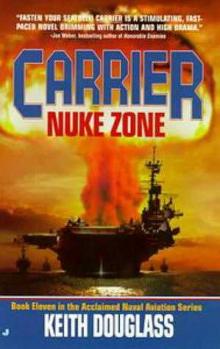 Nuke Zone c-11
Nuke Zone c-11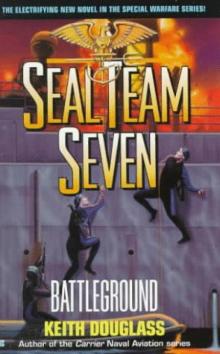 Seal Team Seven 6 - Battleground
Seal Team Seven 6 - Battleground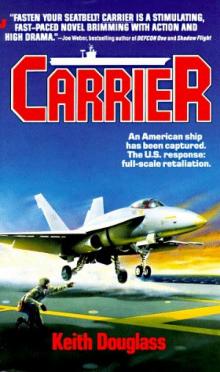 Carrier c-1
Carrier c-1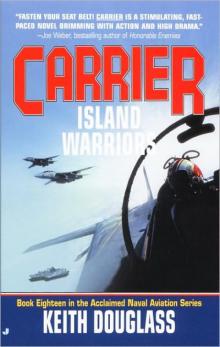 Island Warriors c-18
Island Warriors c-18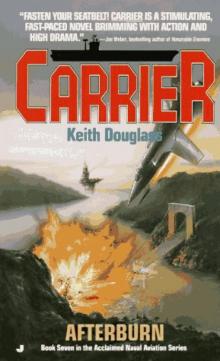 Afterburn c-7
Afterburn c-7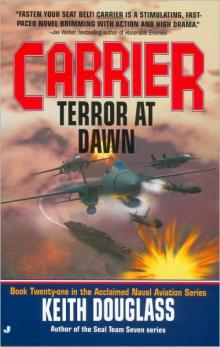 Terror At Dawn c-21
Terror At Dawn c-21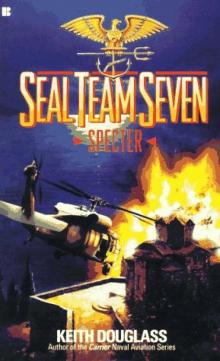 Specter sts-2
Specter sts-2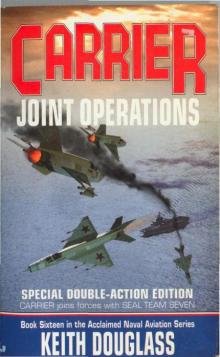 Joint Operations c-16
Joint Operations c-16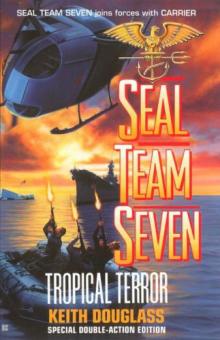 Tropical Terror sts-12
Tropical Terror sts-12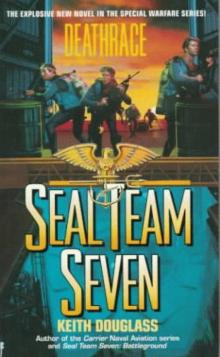 Seal Team Seven 7 - Deathrace
Seal Team Seven 7 - Deathrace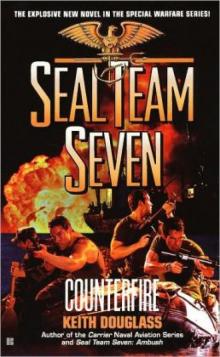 Counterfire sts-16
Counterfire sts-16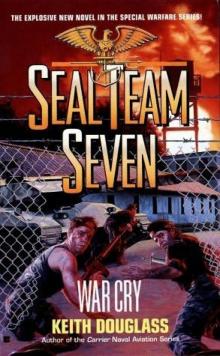 War Cry sts-9
War Cry sts-9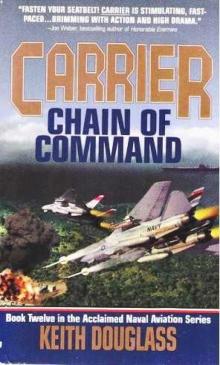 Chain of Command c-12
Chain of Command c-12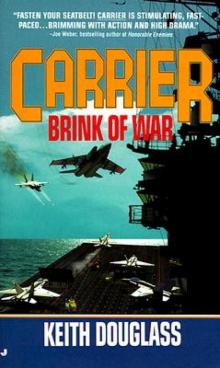 Brink of War c-13
Brink of War c-13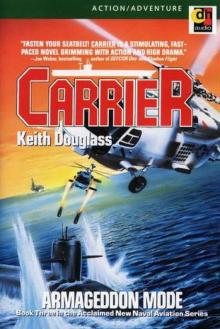 Armageddon Mode c-3
Armageddon Mode c-3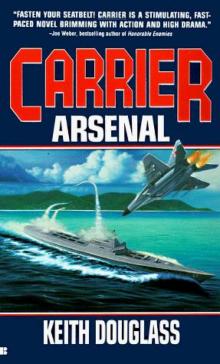 Arsenal c-10
Arsenal c-10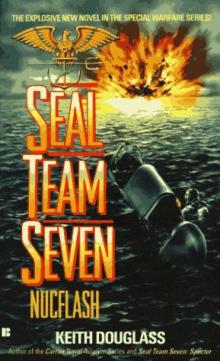 Nucflash sts-3
Nucflash sts-3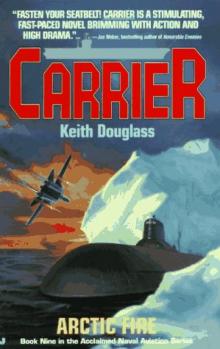 Arctic Fire c-9
Arctic Fire c-9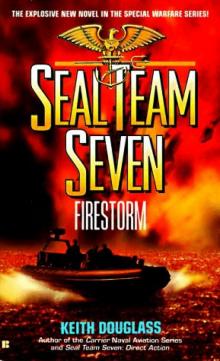 Firestorm sts-5
Firestorm sts-5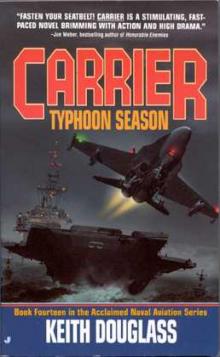 Typhoon Season c-14
Typhoon Season c-14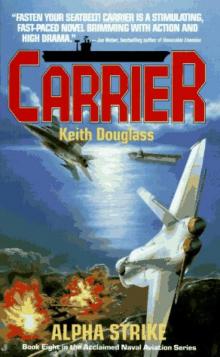 Alpha Strike c-8
Alpha Strike c-8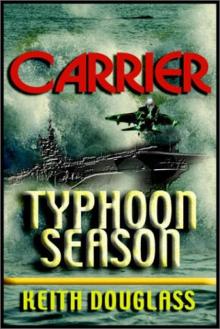 Carrier 14 - TYPHOON SEASON
Carrier 14 - TYPHOON SEASON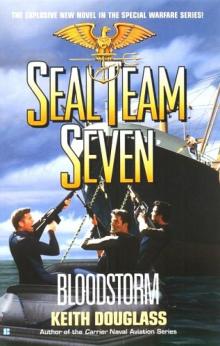 Bloodstorm sts-13
Bloodstorm sts-13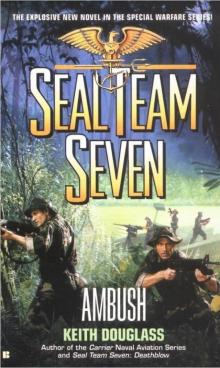 Ambush sts-15
Ambush sts-15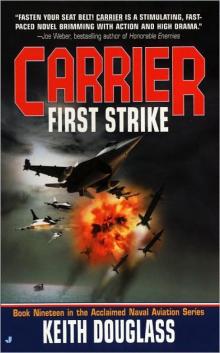 First Strike c-19
First Strike c-19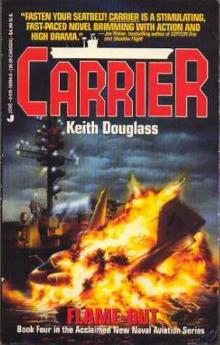 Flame Out c-4
Flame Out c-4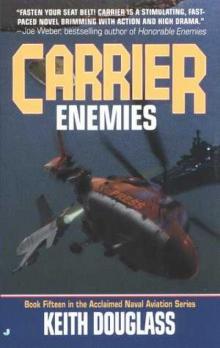 Enemies c-15
Enemies c-15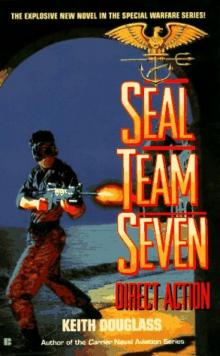 Seal Team Seven 04 - Direct Action
Seal Team Seven 04 - Direct Action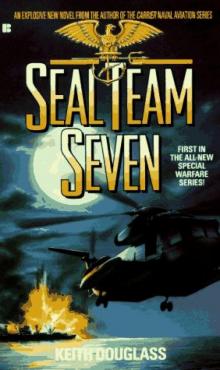 Seal Team Seven 01 - Seal Team Seven
Seal Team Seven 01 - Seal Team Seven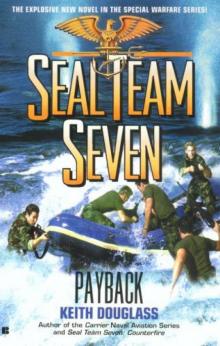 Payback sts-17
Payback sts-17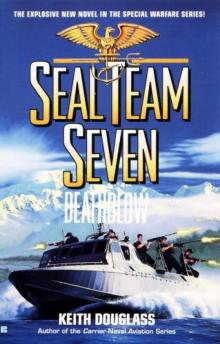 Death Blow sts-14
Death Blow sts-14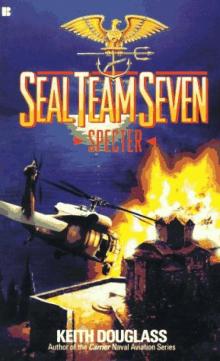 Seal Team Seven 02 - Spector
Seal Team Seven 02 - Spector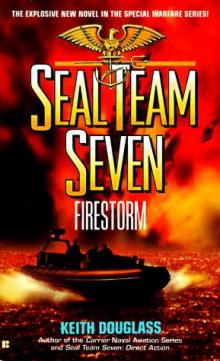 Seal Team Seven 5 - Firestorm
Seal Team Seven 5 - Firestorm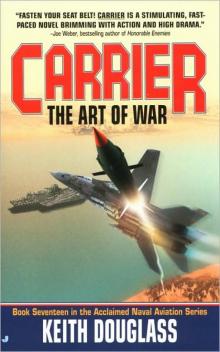 The Art of War c-17
The Art of War c-17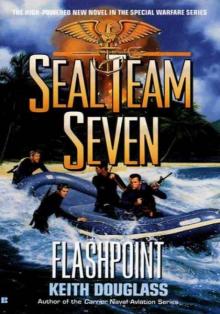 Flashpoint sts-11
Flashpoint sts-11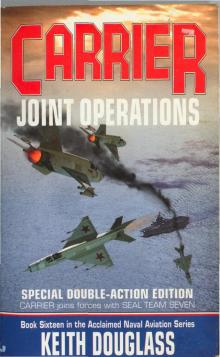 Carrier - Joint Operation Book 16
Carrier - Joint Operation Book 16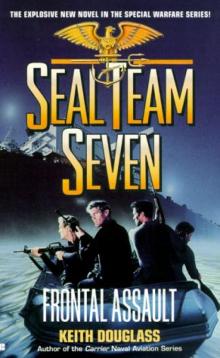 Frontal Assault sts-10
Frontal Assault sts-10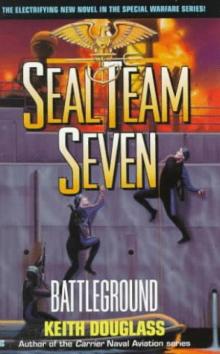 Battleground sts-6
Battleground sts-6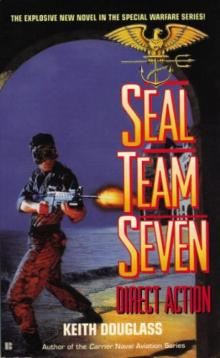 Direct Action sts-4
Direct Action sts-4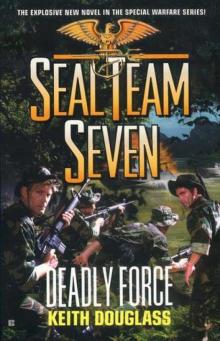 Deadly Force sts-18
Deadly Force sts-18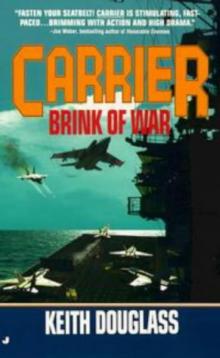 Carrier 13 - Brink of War
Carrier 13 - Brink of War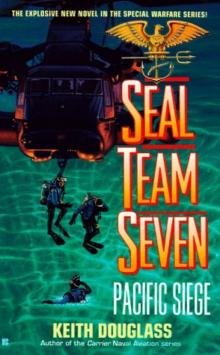 Pacific Siege sts-8
Pacific Siege sts-8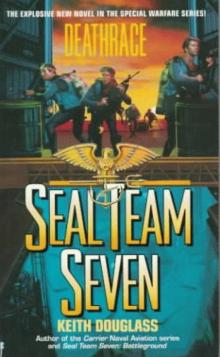 Deathrace sts-7
Deathrace sts-7